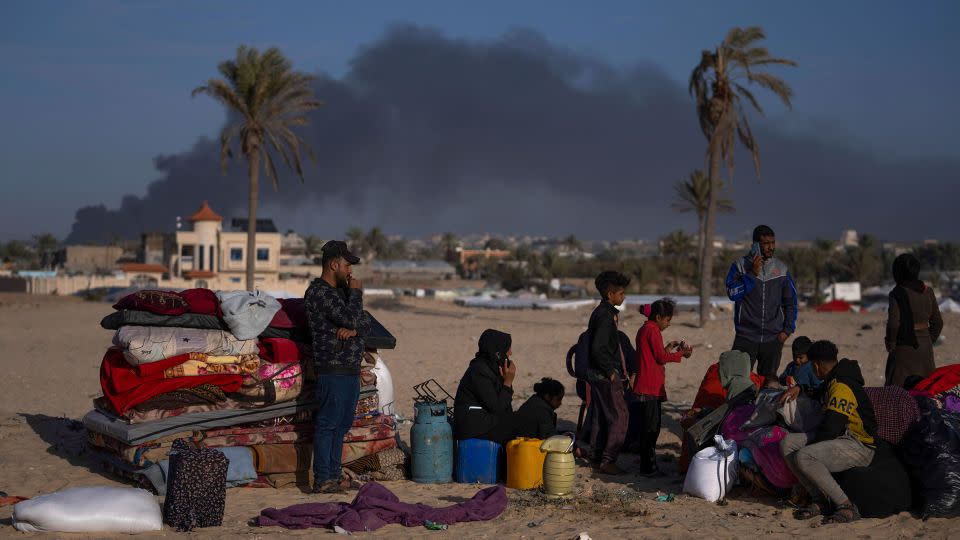Gaza endgame: Inching toward a deal to end the war

As the Gaza war nears its fifth month, with more than 25,000 Palestinians - civilians and combatants - dead and Israel nowhere close to achieving its objective of destroying Hamas, no one seems to have come up with a concrete proposal that’s palatable to both parties to pause the conflict, let alone end it. But there are suggestions, however half-baked, from both sides, that show a willingness to talk.
Indeed, Qatar - the main go-between - says there are “serious discussions” with Israel and Hamas, and is receiving “constant replies” from both sides. They’re not “negotiations” yet, says the White House. But with indirect talks ongoing, we seem to be inching towards what Ofer Shelah, Senior Researcher with Israel’s Institute for National Security Studies (INSS), describes as a “Zopa” - a zone of possible agreement.
On Monday Axios reported Israel had proposed a two-month truce in exchange for the release of all the 100-plus hostages still held in Gaza. Later that day CNN learned that Mossad chief David Barnea had suggested allowing Hamas leaders to go into exile as part of a broader ceasefire. On Tuesday, The Wall Street Journal said Hamas was now open to releasing some of the hostages in exchange for a pause in the fighting. And Reuters reported that Israel and Hamas had agreed in principle to a one-month truce, during which abductees would be freed and Palestinian prisoners held in Israeli jails released.
The sticking point there appears to be that Hamas wants a “package deal” which would include a second-phase agreement to end the war. But even if Israel were to okay this, it’s unlikely to feel compelled to keep its word. “I don’t think even [Hamas leader Yahya] Sinwar is under the impression that any hostage deal would in fact end the Israel-Hamas conflict,” Shelah tells CNN. “Either they don’t want to do a deal,” he says, or it’s just posturing for domestic consumption.
So how about exile? For now, at least, that seems a non-starter. Qatari Prime Minister Mohammed bin Abdulrahman Al-Thani reportedly told US Secretary of State Antony Blinken that it “would never work.” Hamas leaders, it’s understood, would rather go down fighting in Gaza. They know living abroad wouldn’t stop them being knocked off by the Mossad. Unlike PLO founder Yasser Arafat, who went from exile in Beirut to exile in Tunis, Gaza is home to Hamas’ senior leadership. Moreover, even Israel doesn’t seem overly keen. “The exile of Sinwar is not Israel’s position and has not been offered by Israel,” a senior Israeli government official told me.
And while emissaries are talking, and the IDF and Hamas are fighting, pressure on the Israeli government to bring the hostages home is growing. Over the weekend, protesters camped outside Prime Minister Benjamin Netanyahu’s home to demand a deal to bring them home. “Right now someone is being raped in a tunnel,” former hostage Aviva Siegel told the Knesset on Tuesday. On Wednesday, they held a day of action, blocking roads. On Thursday, they blocked humanitarian aid deliveries to Gaza. It also emerged that Netanyahu had taken to blaming Qatar for slow progress in getting the hostages freed - prompting a rebuke from the emirate’s foreign ministry.
An all-for-all deal is another option that’s been mooted since October 7. In other words, freeing all Palestinian prisoners held in Israeli jails - including those whom Israel says have blood on their hands - in exchange for freeing all the hostages. But even if such a scenario were on the table, a survey published by the Israel Democracy Institute on Wednesday found more than half of Israelis would be against it.
For now, though, such talk remains moot, with an Israeli official telling CNN there’s no concrete deal on the table. Pummeling Hamas, says former IDF General Israel Ziv, ought to help. “There is no doubt there’s not a single Israeli who doesn’t want the hostages home,” he tells CNN. “But at the same time we can’t gamble on the future of Israel [by leaving Hamas in control of Gaza]. And to have both we need to apply the most military pressure in order to get the maximum position in negotiations.”
Ziv reckons it will take up to a month longer for the IDF to crush Hamas brigades in Khan Younis, in southern Gaza, where intense fighting has been taking place; an UNRWA shelter there was struck on Wednesday, killing at least a dozen displaced Palestinians. Any deal Israel is looking to seal, says Ziv, would be more likely to come into effect once the Khan Younis operation is complete.
Of course, the endgame in Gaza isn’t only subject to military considerations, hostage families demanding a deal, or even pressure from the United States to wind things down. There’s also politics. The latest polls spell disaster for the career of Israel’s longest-serving leader. One recent survey found more than half of all Israelis believe Netanyahu’s war policies are born of self-interest. Gadi Eisenkot, a former chief of staff who sits in the war cabinet and whose own son was recently killed in Gaza, says he doesn’t believe that’s the case, but he does say that destroying Hamas is unrealistic.
With that in mind, this round of the Israel-Hamas war probably won’t be the last. “Israel should agree to almost any kind of deal that brings the hostages home,” says the INSS’s Shelah. “Because it won’t be the end of the war anyway.”
For more CNN news and newsletters create an account at CNN.com


